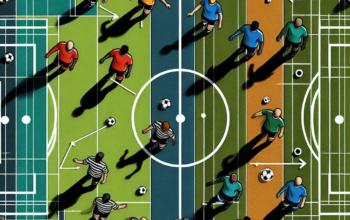Introduction
Behind the scenes in the world of professional basketball lies a crucial yet often overlooked profession: the NBA agent. These individuals act as the bridge between players and their dreams, negotiating contracts, navigating the complexities of the league, and shaping athletes’ careers. Life as an NBA agent in 2025 is multifaceted, involving a blend of business acumen, negotiation skills, and a deep understanding of the sport. This article dives into the intricacies of being an NBA agent, shedding light on the challenges, responsibilities, and rewards that come with this pivotal role.
The Role of an NBA Agent: A Comprehensive Overview
The responsibilities of an NBA agent extend far beyond simple contract negotiations. First and foremost, they are advocates for their clients, ensuring fair compensation for players while also managing public relations and team relationships. An agent’s day-to-day activities can include scouting potential talent, developing marketing strategies, and advising players on career decisions. In 2025, the landscape of agent work has evolved with the integration of technology, and many agents now employ data analytics and player performance metrics to optimize their negotiations and marketing strategies.
In addition, NBA agents often take on the role of mentor and advisor to their clients. They need to be well-versed in a wide range of issues, from financial planning to personal brand management. On the financial side, agents guide players on investments, endorsements, and savings, helping them secure their financial futures when their playing days are over. The rise of social media and digital branding has also added another layer to an agent’s responsibilities, as they need to craft and maintain their clients’ public images in a rapidly changing digital landscape.
The Path to Becoming an NBA Agent
Becoming an NBA agent is not a straightforward journey. Generally, it requires a deep understanding of the sport, a strong personal network, and the ability to navigate the legalities of contracts and negotiations. Many agents begin their careers in sports management or law, obtaining degrees in these areas to bolster their knowledge base. Internships with existing agencies or teams can also provide valuable experience and contacts that are essential when starting out.
In 2025, the process has become increasingly competitive, with more individuals seeking to enter the profession due to the high-profile nature of NBA players and the lucrative potential of the career. Aspiring agents often seek certification from the NBA Players Association, which ensures they adhere to certain standards and practices. Networking is paramount, as relationships with team executives, coaches, and other agents can be crucial in securing deals and representing clients effectively.
The Art of Negotiation in NBA Contract Deals
Negotiation is undoubtedly the heart of an NBA agent’s job. Agents must balance the desires and goals of their clients with the constraints and interests of teams and the league. The 2025 market has made this task even more intricate, as player salaries continue to rise with the influx of new broadcasting deals and revenue sharing models. Agents must be able to articulate their client’s value while also understanding the broader financial landscape of the NBA, which can include salary caps, luxury taxes, and the implications of collective bargaining agreements.
The negotiation process often involves preparing clients to make critical decisions regarding contract offers, including long-term contracts versus short-term deals. Players may have personal preferences regarding where to play and how much security they want, which adds layers of complexity to negotiations. A successful NBA agent not only secures the best financial terms for their clients but also ensures that the player is in a conducive environment for their growth and success.
During the negotiation process, building rapport and fostering relationships with team executives becomes essential. Trust and credibility can significantly impact the outcome of negotiations. In an age where transparency is increasingly demanded by players and fans alike, agents must navigate players’ emotional needs while ensuring that the business side is handled professionally.
<h2Navigating the Challenges of the NBA Agent Profession
While the rewards of being an NBA agent can be significant, the career is fraught with challenges and uncertainties. Market saturation is one critical issue; with more agents vying for a limited pool of talent, competition can be fierce. Agents not only compete against their peers but also against large agencies that have more resources and established reputations. This environment necessitates differentiation, compelling agents to use innovative strategies to attract and retain clients.
Additionally, the pressures of public scrutiny cannot be ignored. Today, NBA players are often in the spotlight, and their choices—whether in contract negotiations or personal branding—can impact their careers significantly. Agents must be adept at managing both the reputational risks their clients face and the media’s portrayal of them. The rapid dissemination of information through social media means that agents must be more proactive than ever in crisis management, often needing to handle situations that arise unexpectedly.
Networking and client retention are pivotal, and maintaining strong relationships can be a full-time job. Players may switch agents, even at critical moments in their careers, which can put pressure on established figures in the industry. Agents must continually demonstrate their added value in order to keep their clients satisfied and engaged. The evolving landscape of player empowerment also means that agents must recognize that players are more informed and involved in their decisions than ever before.
The Future of NBA Agents: Trends and Predictions
As we move forward in 2025, the role of NBA agents is poised to undergo significant changes. Technology will play an increasingly central role, with data analytics becoming a cornerstone in negotiations and client management. Agents who can harness technology to analyze performance metrics and market trends will likely have a competitive advantage. We may also see more agents developing their platforms to directly connect with fans and clients, further establishing their personal brands in an increasingly transparent world.
Additionally, the evolving landscape of player empowerment will lead to more collaborative relationships between agents and players. As athletes become more aware of their market value and expectations, agents will need to step beyond traditional roles and facilitate partnerships that align with players’ personal and professional goals. The relationship between agents and teams may also evolve into a more open dialogue, paving the way for smoother negotiations and reduced friction.
Moreover, the focus on mental health and well-being among athletes will likely impact the expectations players have of their agents. In the future, agents could see a demand for holistic support encompassing mental health resources, personal development, and community engagement, further expanding the scope of their role.
Conclusion
Being an NBA agent in 2025 is a complex and dynamic career that combines passion for basketball with sharp business acumen. From negotiating lucrative contracts to advising players on personal branding and finances, agents play a vital role in shaping the careers of professional athletes. The challenges they face, such as market saturation and public scrutiny, require ingenious strategies and strong networking skills. Looking ahead, the integration of technology and the evolving landscape of player empowerment promise to redefine the role of agents even further. Ultimately, NBA agents will continue to be pivotal players behind the scenes, influencing the future of basketball.
FAQs
What qualifications do you need to become an NBA agent?
To become an NBA agent, you typically need a bachelor’s degree in sports management, business, or law. Many aspiring agents pursue certifications from the NBA Players Association, which requires passing a rigorous exam.
What is the average salary of an NBA agent in 2025?
As of 2025, the salary of an NBA agent can vary widely based on experience, clientele, and negotiations. Successful agents can earn millions of dollars annually, particularly when representing high-profile clients.
How do NBA agents negotiate contracts?
NBA agents negotiate contracts by assessing market conditions, understanding team budgets, and leveraging player performance data. They advocate for their clients’ best interests while maintaining relationships with team executives.
What are the biggest challenges faced by NBA agents?
NBA agents face challenges such as intense competition, the pressures of public scrutiny, and the need to continuously adapt to the evolving landscape of player empowerment and technology.
How has technology impacted the role of NBA agents?
Technology has transformed the role of NBA agents by enabling them to use data analytics for player assessments, streamlining communication with clients, and enhancing personal branding strategies in the digital space.






